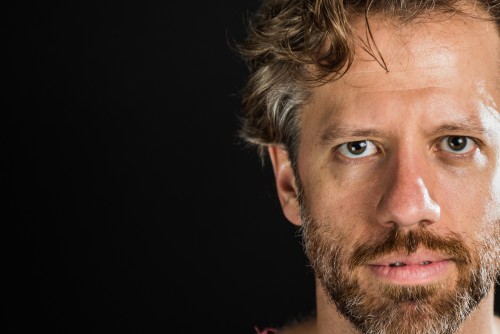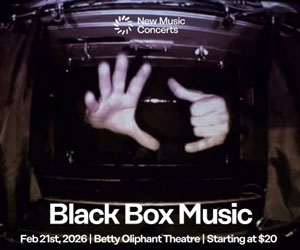 When Canada’s largest opera company commissions a new opera like Hadrian from Rufus Wainwright and Daniel MacIvor, it will necessarily be seen as the major event of the season. Yet we should not forget that Toronto’s smaller opera companies have been creating new operas and new interpretations of opera all along. One of the most exciting of these is Against the Grain Theatre which will be presenting two important operas this season. The first is BOUND v. 2 by composer Kevin Lau to a libretto by AtG artistic director Joel Ivany. The second is a major revival of Kopernikus, the only opera by Québecois composer Claude Vivier (1948-83). I spoke with Ivany in October about BOUND v. 2, which plays for only three performances in November, about its background and intent.
When Canada’s largest opera company commissions a new opera like Hadrian from Rufus Wainwright and Daniel MacIvor, it will necessarily be seen as the major event of the season. Yet we should not forget that Toronto’s smaller opera companies have been creating new operas and new interpretations of opera all along. One of the most exciting of these is Against the Grain Theatre which will be presenting two important operas this season. The first is BOUND v. 2 by composer Kevin Lau to a libretto by AtG artistic director Joel Ivany. The second is a major revival of Kopernikus, the only opera by Québecois composer Claude Vivier (1948-83). I spoke with Ivany in October about BOUND v. 2, which plays for only three performances in November, about its background and intent.
BOUND v. 2 is the second stage in AtG’s experiment with a three-year, concept-to-realization production. The first stage, simply titled BOUND, premiered in December 2017 and presented the basic concept of artists choosing various arias and ensembles by George Frideric Handel to which Ivany would write new lyrics. The premise was that seven citizens were detained by a government and held against their will in a waiting room. The audience watched and heard about their struggles, hopes and fears. Composer Lau introduced new sound ideas and arrangements to place the arias in a modern sound world.
BOUND v. 2 takes BOUND a significant step further. BOUND v. 2 is no longer a collection of reimagined, repurposed Handel arias that Lau has arranged. Rather it is now a fully fledged opera by Lau inspired by Handel. As Ivany says: “Kevin Lau received a commission for this project between last year and this year. What he’s written will be used in our third and final version. In the last month or six weeks he’s really immersed himself in the world of Handel to essentially write a brand new opera which, especially for us, is kind of unreal. Typically we’ve taken a Mozart or Puccini opera and written a new story on top of that which is familiar and exciting. But for this, Lau has done more than arranging. He is adding his own composition so that this is truly a new piece inspired by Handel about the humanity crises which we, unfortunately, are still reading about in the news. We’re still hearing these stories about persecuted people both in North America and abroad.”
The first version of BOUND was written for seven soloists and piano. BOUND v. 2 is written for four soloists and a ten-piece chamber orchestra with electronics. Of BOUND v. 2, Ivany says: “It is further fleshed-out musically in that Kevin has taken melodies and scenes but written them brand new. The opera is by Kevin Lau but you will definitely say this sounds like Handel.”
Why do this? Ivany explains: “Many people around the first version were saying why not just write a brand new piece, but Kevin very intellectually says this is a unique challenge to take these stories [by Handel] which were written in a specific context and to start with them. But then to move them somewhere else is compositionally an unusually interesting creative challenge. For the company, this is a further step after our Orphée where we take these tunes and melodies that have stood the test of time and ask what they could sound like to an ear of today.”
The obvious question is that if BOUND v. 2 will eventually be the basis for a new opera, why retain the link to Handel? Ivany responds to this in several ways: “At one point we were talking to [COC general director] Alexander Neef, who was talking about the party atmosphere of Handel and how people would go to socialize at the opera. He was curious about what a Handel mashup with AtG could look like. We took that idea and instead of going the party route we were charged by the fuel of the political nature of what was going on in the world. We looked back at who Handel was and how he gave a performance of his Messiah at the Foundling Hospital in London in 1750 where all the proceeds went to keeping the hospital going. We saw he had an intention behind his genius to do good as well.” Indeed, a BBC documentary states that the 1750 performance of Messiah was “the first ever secular charity benefit concert in which art and philanthropy came together to raise money from the haves for the have-nots.”
Ivany continues: “We saw that Handel was a composer who had social responsibility in his heart that obviously comes across through his music, whether it was his Messiah, or Jephtha or Alcina. He wrote these very complex characters of people who were being persecuted and what they would sing about their plight. And so Handel seems in some ways a very fitting composer for our subject. Last year we sat the singers just around a table and asked what arias speak to you and why and what contemporary stories do you find that speak to you. And then we married those two together and tested it in version 1 and saw what worked.”
Ivany has lots of experience in past AtG shows of writing a new libretto to pre-existing music as AtG’s version of Puccini’s La Bohème (2011) and Mozart’s Figaro’s Wedding (2013),Uncle John (2014) and A Little Too Cosy (2015). Ivany explains how this process works when now he has to add substantially different content to an aria as well as translating it: “With BOUND v. 2 and working with the previous version and with Kevin as well, a lot of the music has come first. He’s found this beautiful melody and we can tweak it as we find the text, but it’s not the traditional way that this is done and so he’s been inspired by themes. For example, he told me, ‘Here is a portion where Miriam [Khalil]’s character sympathizes with the refugee crisis and I don’t know how you can make that work.’ But I’m able to find the arc in what he’s written and match that story with it. I think this only makes the music much more powerful. Obviously in opera traditionally the text comes first, but in opera it’s the music more than the text which moves you.”
Of the production in general, Ivany says: “I’m really curious to know how this opera will resonate with people knowing that it was primarily driven by the music. In the third version I intend not to act as stage director, which will be a big leap of faith for me because I’m used to uber-controlling everything. It’s a big step for our company. It was a test and it’s becoming more of a turning point. I think that’s healthy for the company and for these types of unique shows that are a mashup of old and new, old stories and new stories, old music and new text.”
The third and final version of BOUND will be AtG’s feature production in 2020 and the world premiere of this opera, Ivany explains. “We have intentionally been taking a step-by-step process to culminate in what we anticipate as an immersive experience for both the audience and performers. It’s hard to push repeat on certain things and it turns our hair grey in terms of each time we do a new thing, but it keeps us creative.”
As one might guess from AtG’s past projects, Ivany is keen to demolish the notion that opera is an elitist genre: “I don’t consider myself elite. In fact I consider myself very un-elite. So I think that opera is for everyone who is willing to be open to it and not just a specific group of people. We hope that we can show that in our works.”
BOUND v. 2 is performed as a workshop concert and runs November 19, 20 and 21 at the Great Hall, 1087 Queen St. W. The singers are soprano Miriam Khalil, countertenor David Trudgen, tenor Andrew Haji and baritone Justin Welsh as the cast of detainees with actor Martha Burns as the voice of the State. The music includes stylings by modular electronic artist Acote. AtG founding member and music director, Topher Mokrzewksi, conducts.
Christopher Hoile is a Toronto-based writer on opera and theatre. He can be contacted at opera@thewholenote.com.



